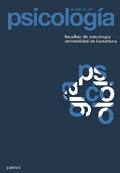The uneasy relationship between theory, practice and methodology in 21 st century psychology. (I) Some dilemmas
Abstract
Over the years, practical decisions in the behavioural sciences have been based on knowledge allegedly acquired by investigation which, also allegedly, applies the rules of scientific research. The distinction between social and epistemological systems implied in the opposition between the system of science and technology and the system of interaction and communication, can help us to understand why “scientific research” in practice yields such inconsistent results, and is in itself so inconsistent. It seems that investigation in the practical world cannot apply the approaches of the scientific and technical world. If we add to this concern the fact that theoretical concepts in the behavioural sciences are indebted to positivism and functionalism, it is debatable whether it is possible at all to work scientifically in this field. We also present several historical reflections on the problem to illustrate how methodology in the behavioural sciences evolved into a series of stereotypical, incomplete and idiosyncratic practices accepted as the quintessence of scientificity. The relationships between practice, theory, research and methodology are indeed uneasy in the behavioural sciences. Key words: Psychological methodology, theory, practice, quantification.Downloads
Published
2009-02-12
Issue
Section
Articles
License
The authors who publish in this journal agree to the following terms:
Authors transfer to the publisher all copyright for the full term of protection and for all the world.
The authors can post a copy of their articles in accordance with the policy of free access to the journal.


